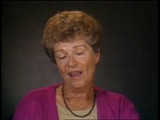You searched for: Auschwitz
<< Previous | Displaying results 811-820 of 878 for "Auschwitz" | Next >>
-
Leon Rupnik
ArticleDuring World War II, Slovene general Leon Rupnik collaborated with the forces of Fascist Italy and Nazi Germany. Rupnik was appointed president of the Provincial Government of the German-occupied Province of Ljubljana in 1943. He was convicted of treason and executed in 1946. In 2020, his sentence was annulled on a technicality.
-
Barbara Ledermann Rodbell describes her reaction to Nazi-mandated schools for Jewish children in Amsterdam
Oral HistoryIn 1933 Barbara's family moved to Amsterdam, in the Netherlands. They became friends of Anne Frank and her family. The Germans invaded the Netherlands in 1940. Barbara's boyfriend, Manfred, had underground contacts and she got false papers. Her mother, sister, and father were deported to Westerbork and then to Auschwitz. Barbara survived using her false papers and worked for the resistance. She helped take Jews to hiding places and also hid Jews in an apartment held in her false name.
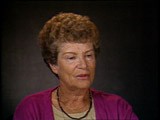
-
Miriam Farcus Ingber describes witnessing a suicide attempt in the Stutthof camp
Oral HistoryMiriam was one of ten children born to a poor, religious Jewish family in Terava, Czechoslovakia. When Hungary took over the area in 1939, almost half the town's Jewish population was deported and sent to labor camps. Later, Miriam and her mother were forced into a ghetto. They were deported to the Auschwitz camp in 1944. After about three months, they were sent to the Stutthof camp. Toward the end of the war, Miriam and her mother were forced on a death march. They and others on the death march were…
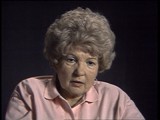
-
Kurt Klein describes some of the difficulties involved in emigrating from Germany
Oral HistoryAs Nazi anti-Jewish policy intensified, Kurt's family decided to leave Germany. Kurt left for the United States in 1937, but his parents were unable to leave before the outbreak of World War II. Kurt's parents were eventually deported to Auschwitz, in German-occupied Poland. In 1942, Kurt joined the United States Army and was trained in military intelligence. In Europe, he interrogated prisoners of war. In May 1945, he took part in the surrender of a village in Czechoslovakia and returned the next day to…
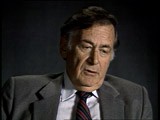
-
Hanne Hirsch Liebmann describes a Children's Aid Society (OSE) visit and life in Le Chambon-sur-Lignon
Oral HistoryHanne's family owned a photographic studio. In October 1940, she and other family members were deported to the Gurs camp in southern France. In September 1941, the Children's Aid Society (OSE) rescued Hanne and she hid in a children's home in Le Chambon-sur-Lignon. Her mother perished in Auschwitz. In 1943, Hanne obtained false papers and crossed into Switzerland. She married in Geneva in 1945 and had a daughter in 1946. In 1948, she arrived in the United States.
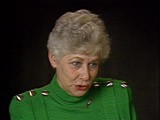
-
Barbara Ledermann Rodbell describes false papers and moving people to hiding places
Oral HistoryIn 1933 Barbara's family moved to Amsterdam, in the Netherlands. They became friends of Anne Frank and her family. The Germans invaded the Netherlands in 1940. Barbara's boyfriend, Manfred, had underground contacts and she got false papers. Her mother, sister, and father were deported to the Westerbork camp and then to Auschwitz. Barbara survived using her false papers and worked for the resistance. She helped take Jews to hiding places and also hid Jews in an apartment rented under her false name.
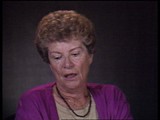
-
Fred Bachner describes flight to eastern Poland upon the German invasion of Poland in September 1939
Oral HistoryFred was born to Polish Jewish parents in Berlin, where his father owned a factory. After the Kristallnacht ("Night of Broken Glass") pogrom in November 1938, Fred's father and brother were deported to Poland. It was not until June 1939, when Poland allowed Fred and his mother to enter the country, that the family was reunited in Krakow. Fred and his family tried to flee upon the German invasion of Poland in September 1939 but were told to return to their homes. They were forced into the Krakow ghetto, and…

-
Ruth Webber describes her mother's efforts to ensure her children's survival
Oral HistoryRuth was four years old when the Germans invaded Poland and occupied Ostrowiec. Her family was forced into a ghetto. Germans took over her father's photography business, although he was allowed to continue working outside the ghetto. Before the ghetto was liquidated, Ruth's parents sent her sister into hiding, and managed to get work at a labor camp outside the ghetto. Ruth also went into hiding, either in nearby woods or within the camp itself. When the camp was liquidated, Ruth's parents were split up.…
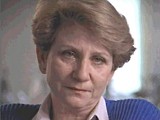
-
Wilek (William) Loew describes the hiding place in which his mother survived an Aktion in Lvov
Oral HistoryWilek was the son of Jewish parents living in the southeastern Polish town of Lvov. His family owned and operated a winery that had been in family hands since 1870. Wilek's father died of a heart attack in 1929. Wilek entered secondary school in 1939. Soon after he began school, World War II began with the German invasion of Poland. Lvov was in the part of eastern Poland annexed by the Soviet Union. Although the Soviets took over Wilek's home and the family business, Wilek was able to continue his…
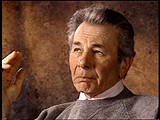
-
Barbara Ledermann Rodbell describes receiving her first set of false papers
Oral HistoryIn 1933 Barbara's family moved to Amsterdam, in the Netherlands. They became friends of Anne Frank and her family. The Germans invaded the Netherlands in 1940. Barbara's boyfriend, Manfred, had underground contacts and she got false papers. Her mother, sister, and father were deported to Westerbork and then to Auschwitz. Barbara survived using her false papers and worked for the resistance. She helped take Jews to hiding places and also hid Jews in an apartment held in her false name.
